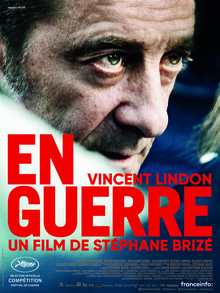VIFF 2018 - At War

At War (En Guerre) is director Stéphane Brizé's second feature on an ever-enduring subject: the struggle between labour, capital, and the powers that compel them both. It is set in an industrial town in southern France that is on the verge of complete economic disenfranchisement: workers at the Perrin factory plant, the major source of employment
for the town, were abruptly laid off following the news of imminent closure, despite the fact that they were only two years into a five-year employment contract. As these things tend to unfold in France, a mass worker's strike is called, led by union leader Laurent Amédéo (Vincent Lindon) and supported by the rest of the town (a cast composed mostly of real-life workers themselves). What follows is a sustained, months-long fight, occurring concurrently within a myriad of spheres —the judicial, the corporate, the popular, the national, and between workers themselves—, ending in an abrupt escalation that is at once expected and viscerally shocking.
Much of At War feels like a documentary. The film begins in media res, in midst of one of many protests, and the shaky cinematography immerses the audience right into the action. It is not a particularly lengthy film, but the plot is rather sparse; what it does miraculously well is the way it manipulates tension and holds the attention of the viewer through essentially what are ceaseless tirades of shouts and murmurs (but mostly shouts) in the span of an hour and forty minutes. We never get to know more about the striking workers and their families, besides the fact they like to drink (often with each other), fight (often with each other), and that they have nothing to lose. But what it sacrifices in personal narratives it makes up for in a universal sensibility; you don't have to be an expert in French syndicalism or the history of labour movements to see that there is something so profoundly moving and desperate that is being captured in this particular moment, in this particular little town on the Garonne River.
The film begins with a quote by the famed Marxist theorist Bertolt Brecht: "If you fight you might lose, if you don't you have already lost". What transpires is a somewhat grotesque interpretation of the same idea taken to a demoralizing conclusion: all we see are the workers fighting, —against the judicial system, the media, the corporate powers, the state, and amongst themselves— and losing anyway. Is there anything to be gained from this? Is this cinematic realism, or an ultimately defeatist mockumentary? Does it indulge in a perverse cynicism of suffering, or is it a depressingly accurate portrayal of the state of labour movements under neoliberal capitalism? I find myself sometimes oscillating
between the two, and often in between. All I can offer is another Brecht quote: "Only the lessons of reality can teach us to transform reality".
